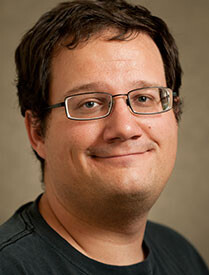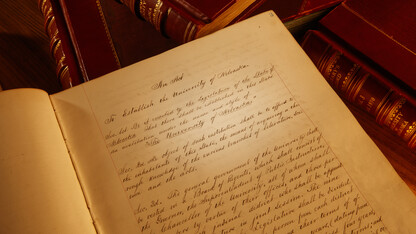
In the digital age, we live in silos. Whether it be reading the news or playing a favorite video game, we can choose with whom and what we interact.
How can we become better citizens and more thoughtfully navigate this technology-driven world? And why would we want to?
Questions like these prodded at Sean Trundle, assistant professor of practice in history and scholar of the mid-20th century.
And another: Are there better ways to engage students in the coursework? As a teacher, he saw students wondering why they weren’t being taught in ways that better reflected the way they lived: with a computer or smart phone nearby.
“As a graduate student at the University of Hawaii, I heard from students often that the kind of media they were interacting with was not being represented in our course offerings,” Trundle said.
Trundle came to UNL in 2014 with an idea for a class that tackles this problem and also challenges the students to become better, more critical consumers of digital media.
The 300-level course is set up as a game. Each student is a “Digizen” and completes tasks to earn experience tokens in the course’s three desired skill sets: historical mastery, which focuses on learning about the history of digital technology; critical engagement, which addresses interpreting digital media as primary sources and using critical thinking to draw conclusions; and media literacy, which hones in on using digital tools to create and produce cultural expressions.
Trundle got the idea from the gameful design movement, which he has studied.
“The average player spends like 10 or 12 hours a week and dedicated players would spend 50 to 60 hours a week playing games,” Trundle said. “There have been people looking at it from different angles, but with the same question of ‘Why are they doing this?’
“It looks like work. It looks like labor, but they’re not getting paid for it. Out of that came this gameful design movement to figure out what is so compelling about games and bring that into other areas of life.”
Students can choose from several tasks, from posing a question about a reading in a class discussion board to video blogging about a current event or topic or studying the political slant with which a news story or blog entry is written. They earn points with each completed mission and can track their progress on the leaderboard in the wiki space that Trundle set up. The score dictates their grade and also earns them first pick of their teammates for midterm exams and final projects.
“The structure of this course as a game and giving them a range of options as they choose how they want to navigate their way through the course has appealed to a lot of them,” Trundle said.
Carson Hayden, a history major and fourth-year undergraduate, said the ability to choose his own homework makes the course more valuable.
“We’re using missions to gain experience rather than doing assignments,” Hayden said. “You have to be dedicated to doing a significant amount of work outside of class to gain your experience points, but it’s work you choose.”
Also valuable, Hayden said, are the topics that are being covered in class, including privacy in the internet age, government surveillance and media isolation.
“It’s gotten me thinking a lot about the politics of digital media,” Hayden said. “I’ve never taken a history class that’s so modern, either.”
And, as Trundle explained to his students one day in class, living in the silos that digital media create is not good for solving problems in a democracy.
“We don’t have to read the stuff we disagree with or that offends us,” Trundle said. “That sounds really good, but when we’re thinking about a democratic society, that poses a real problem when we sit down to make decisions about what to do.”
Trundle said the course also bridges an important gap in how students think about history.
“Students often struggle with thinking about our present moment as both a part of and a product of history,” Trundle said. “We tend to think about history as this thing that is over; getting students to think about their own lives as the product of historical forces, or as being historically constructed in certain ways, bridges a critical gap in their understanding of history.”








